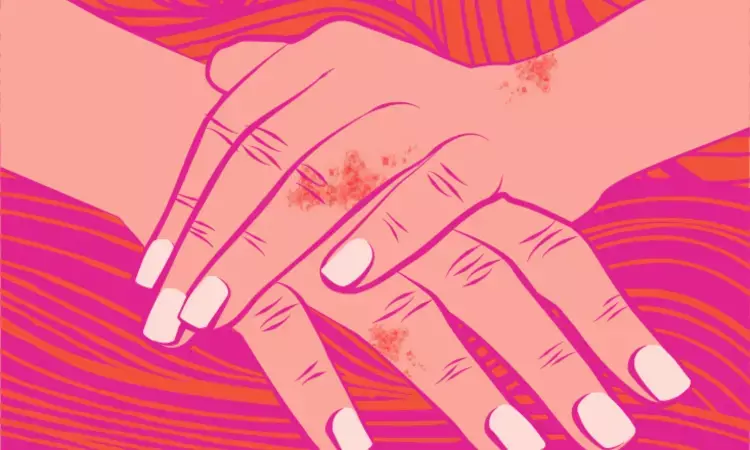- Home
- Medical news & Guidelines
- Anesthesiology
- Cardiology and CTVS
- Critical Care
- Dentistry
- Dermatology
- Diabetes and Endocrinology
- ENT
- Gastroenterology
- Medicine
- Nephrology
- Neurology
- Obstretics-Gynaecology
- Oncology
- Ophthalmology
- Orthopaedics
- Pediatrics-Neonatology
- Psychiatry
- Pulmonology
- Radiology
- Surgery
- Urology
- Laboratory Medicine
- Diet
- Nursing
- Paramedical
- Physiotherapy
- Health news
- Fact Check
- Bone Health Fact Check
- Brain Health Fact Check
- Cancer Related Fact Check
- Child Care Fact Check
- Dental and oral health fact check
- Diabetes and metabolic health fact check
- Diet and Nutrition Fact Check
- Eye and ENT Care Fact Check
- Fitness fact check
- Gut health fact check
- Heart health fact check
- Kidney health fact check
- Medical education fact check
- Men's health fact check
- Respiratory fact check
- Skin and hair care fact check
- Vaccine and Immunization fact check
- Women's health fact check
- AYUSH
- State News
- Andaman and Nicobar Islands
- Andhra Pradesh
- Arunachal Pradesh
- Assam
- Bihar
- Chandigarh
- Chattisgarh
- Dadra and Nagar Haveli
- Daman and Diu
- Delhi
- Goa
- Gujarat
- Haryana
- Himachal Pradesh
- Jammu & Kashmir
- Jharkhand
- Karnataka
- Kerala
- Ladakh
- Lakshadweep
- Madhya Pradesh
- Maharashtra
- Manipur
- Meghalaya
- Mizoram
- Nagaland
- Odisha
- Puducherry
- Punjab
- Rajasthan
- Sikkim
- Tamil Nadu
- Telangana
- Tripura
- Uttar Pradesh
- Uttrakhand
- West Bengal
- Medical Education
- Industry
Biologic treatments demonstrate better outcomes of generalized pustular psoriasis: Study

Biologic treatments demonstrate superior outcomes in patients suffering from generalized pustular psoriasis, suggests a study published in the Journal of American Academy of Dermatology.
Generalized pustular psoriasis (GPP) is a dreadful skin condition, also referred to as 'psoriasis'. It is an abnormal and uncontrolled inflammatory condition, which instead of benefiting the body damages the body's vital tissues and organs. These patients suffer from repeated and regular episodes of GPP, wherein large areas of their skin become red, inflamed, and develop small pus-filled blisters called 'pustules'. Additionally, the patient may also get a fever, feel tired (fatigue), have muscle weakness, or their WBCs may increase. However, generalized pustular psoriasis is quite rare, so there are very limited studies reporting treatments and outcomes for large numbers of patients.
A study was conducted by Miyachi H et. al to report treatments and outcomes within a large cohort of patients suffering from generalized pustular psoriasis and admitted to the hospital.
The researchers utilized a Japanese national inpatient care records, and selected a total of 1516 patients with generalized pustular psoriasis with a mean age of 66 years, who were admitted to a hospital between July 2010 and March 2019. Out of which Fifty patients (3.3%) were admitted to the intensive care unit (ICU), 125 (8.2%) required blood pressure support, and 63 (4.2%) had died. To investigate their characteristics, treatments, and outcomes, they further categorized the patients into three medication groups:
- Biologics (294 patients)
- Oral agents without biologics (948 patients)
- Systemic corticosteroids only (274 patients)
The findings of the study were as follows:
- Patients who received biologics were younger and had fewer comorbidities.
- In-hospital mortality and morbidity were lower in the biologics group as compared to the other two groups; mortality (1.0% [biologics group] vs 3.7% [oral-agents group] vs 9.1% [corticosteroids-only group]; P < .001) and morbidity (5.4% vs 8.2% vs 12%, respectively; P = .02).
- Also, in the biologics group, IL-17 inhibitor use increased over time, with in-hospital mortality and morbidity compared to those of tumor necrosis factor inhibitors.
The authors concluded that thus, biological treatments showed favorable outcomes compared with other treatments.
Reference:
A study titled, "Treatments and outcomes of generalized pustular psoriasis: A cohort of 1516 patients in a nationwide inpatient database in Japan" by Miyachi H et. al published in the Journal of American Academy of Dermatology.
Dr. Shravani Dali has completed her BDS from Pravara institute of medical sciences, loni. Following which she extensively worked in the healthcare sector for 2+ years. She has been actively involved in writing blogs in field of health and wellness. Currently she is pursuing her Masters of public health-health administration from Tata institute of social sciences. She can be contacted at editorial@medicaldialogues.in.
Dr Kamal Kant Kohli-MBBS, DTCD- a chest specialist with more than 30 years of practice and a flair for writing clinical articles, Dr Kamal Kant Kohli joined Medical Dialogues as a Chief Editor of Medical News. Besides writing articles, as an editor, he proofreads and verifies all the medical content published on Medical Dialogues including those coming from journals, studies,medical conferences,guidelines etc. Email: drkohli@medicaldialogues.in. Contact no. 011-43720751


